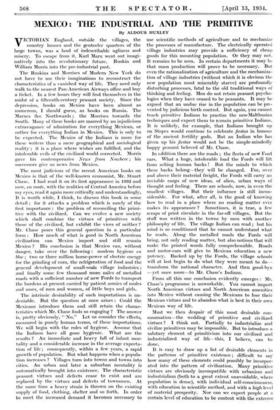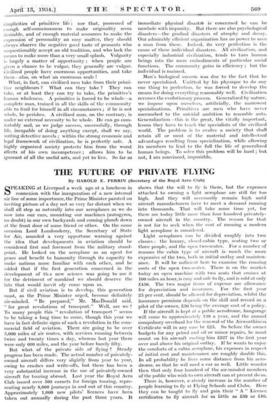MEXICO: THE INDUSTRIAL ANT) THE PRIMITIVE
By ALDOUS HUXLEV
VICTORIAN England, outside the villages, the country houses and the genteeler quarters of the large towns, was a land of indescribable ugliness and misery. To escape from it, Karl Marx went out imagi- natively into the revolutionary future. Ruskin and William Morris into the pre-industrial past.
The Ruskins and Morrises of Modern New York do not have to use their imaginations to reconstruct the characteristics of a vanished way of life. They need only walk to the nearest Pan-American Airways office and buy a ticket. In a few hours they will themselves in the midst of a fifteenth-century peasant society. Since the depression, books on Mexico have been almost as numerous, I should guess, as books on Russia. The Marxes flee Northwards ; the Morrises towards the South. Many of these books are marred by an injudicious extravagance of admiration for everything Mexican, or rather for everything Indian in Mexico. This is only to be expected. The Mexico of the Indians is more for these writers than a mere geographical and sociological reality ; it is a place where wishes are fulfilled, and the intolerable evils of the civilized world corrected. Morris gave his contemporaries News from Nowhere ; his successors give us news from Mexico.
The most judicious of the recent American books on Mexico is that of the well-known eeonomist, Mr. Stuart Chase. I had read it on its first appearance in 1932 and now, en route, with the realities of Central America before my eyes, read it again more critically and understandingly. It is worth while, I think, to discuss this book in some detail ; for it attacks a problem which is surely of the first importance : the problem of reconciling the primi- tive with the civilized. Can we evolve a new society which shall combine the virtues of primitives with those of the civilized, but exhibit the vices of neither ? Mr. Chase poses this general question in a particular form : How much of what is good in North American civilization can Mexico import and still remain Mexico ? His conclusion is that Mexico can, without danger, take over the following : modern hygiene en bloc ; two or three million horse-power of electric energy for the grinding of corn, the refrigeration of food and the general development of small-scale village industries ; and finally some few thousand more miles of metalled roads with a sufficient number of new Fords to transport the burdens at present carried by patient armies of mules and asses, of men and women, of little boys and girls.
The intrinsic desirability of such importations is un- deniable. But the question at once arises : Could the Mexicans introduce them and still retain the charac- teristics which Mr. Chase finds so engaging ? The answer is, pretty obviously, "No." Let us consider the effects, measured in purely human terms, of these importations. We will begin with the rules of hygiene. Assume that the Indians have all gone hygienic. What are the results ? An immediate and heavy fall of infant mor- tality and a considerable increase in the average expecta- tion of life ; consequently, within a few years, a rapid growth of population. But what happens when a popula- tion increases ? Villages turn into towns and towns into cities. An urban and later a suburban mentality is automatically brought into existence. The characteristic peasant virtues and defects cease to exist and are replaced by the virtues and defects of townsmen. At the same time a heavy strain is thrown on the existing supply of food, clothing, shelter and so forth. In order to meet the increased demand it becomes necessary to use scientific methods of agriculture and to mechanize the processes of manufacture. The electrically operated village industries may provide a sufficiency of cheap goods for this mounting population. Or they may not. It remains to be seen. In certain departments it may be that mass production will prove to be necessary. But even the rationalization of agriculture and the mechaniza- tion of village industries (without which it is obvious the new population must miserably starve) are profoundly disturbing processes, fatal to the old traditional ways of thinking and feeling. Men do not retain peasant psycho- logies when they have ceased to be peasants. It may be argued that an undue rise in the population can be pre- vented by judicious birth control. But again, you cannot teach primitive Indians to practise the neo-Malthusian techniques and expect them to remain primitive Indians. It is unlikely, for example, that Indians brought up on Stopes would continue to celebrate fiestas in honour of the ancient fertility gods. But an Indian who has given up his fiestas would not be the simple-mindedly happy peasant beloved of Mr. Chase.
In addition there are the roads ; the fleets of new Ford cars. What a huge, intolerable load the Fords will lift from aching human backs ! But the minds to which these backs belong—they will be changed. For, over and above their material freight, the Fords will carry an invisible cargo of new ideas, of alien, urban ways of thought and feeling. There are schools, now, in even the smallest villages. But their influence is still incon- siderable. For what, after all, is the good of knowing how to read in a place where no reading matter ever makes its appearance ? Sometimes, it is true, a few scraps of print circulate in the far-off villages. But the stuff was written in the towns by men with another philosophy of life. The village Indian can read ; but his mind is so conditioned that he cannot understand what he reads. Along the metalled roads the Fords will bring, not only reading matter, but also notions that will make the printed words fully comprehensible. Roads and motor-cars will give to Mexican education a new potency. Backed up by the Fords, the village schools will at last begin to do what they were meant to do— transform the national character. And then good-bye —yet once more—to Mr. Chase's Indians.
From all this one conclusion evidently emerges : Mr. Chase's programme is unworkable. You cannot import North American virtues and North American amenities into Mexico without causing the Mexicans to lose their Mexican virtues and to abandon what is best in their own Mexican way of life.
Must we then despair of this most desirable con- summation—the wedding of primitive and civilized virtues ? I think not. Partially to industrialize and civilize primitives may be impossible. But to introduce a salutary element of primitivism into our civilized and industrialized way of life—this, I believe, can be done.
It is easy to draw up a list of desirable elements in the patterns of primitive existence ; difficult to say how many of these elements could Possibly be incorpor- ated into the pattern of civilization. Many primitive virtues are obviously incompatible with urbanism and industrialism (both tO a great extent unavoidable, where population is dense), with individual self-consciousness, with education in scientific method, and with a high level of material prosperity. Nor can we expect -people at a certain level of education to be content with the extreme simplicities of primitive life; nor that, possessed of- enough self-consciousness to make originality. seem desirable, and of enough material resources to make the expression of 'personality an easy matter, they should always -Observe the negative good taste of peasants who unquestionably accept an old tradition, and who lack the means to Make more than a very small splash. Vulgarity is largely a Matter of opportunity ; when people are given a chalice to be vulgar, they generally are vulgar. Civilized people have enormous opportunities, and take them--L-alas, on what an enormous scale !
What, in fact, can civilized men take from their primi- tive neighbours ? What can they take ? They can take, or at least they can try to take, the primitive's human wholeness. A primitive is forced to be whole—a complete man, trained in all the skills of the community able to fend for himself in all circumstances ; if he is not whole, he perishes. A civilized man, on the contrary, is under no external necessity to be whole. He can go com- fortably and, as we judge sucCess, successfully, through life, incapable of doing anything except, shall we say, writing detective novels ; within the strong economic and legal framework of civilization, he is perfectly safe. A highly organized society protects him from the worst: effects of his own incompetence ; allows him to be ignorant of all the useful arts, and yet to live. So far as immediate physical disaster is concerned he can be unwhole with impunity. But there are also psychological disasters—the gradual disasters of atrophy and decay. Our admirably efficient organization has no power to save a man from these. Indeed, its very perfection is the cause of these individual disasters. All civilization, and especially industrial civilization, tends to turn human beings into the mere embodiments of particular social functions. The community gains in efficiency ; but the individual is maimed.
Man's biological succegs was due -to the fact that he never specialized. Unfitted by his physique to do any one thing to perfection, he was forced to develop the means for doing everything reasonably well. Civilization reverses the evolutionary process. Generalized by nature, we impose upon ourselves, artificially, the narrowest specializations. Primitives are men who have never succumbed to the suicidal ambition to resemble ants. Generalization—this is the great, the vitally important, lesson they have to teach the specialists of the civilized world. The problem is to evolve a society that shall retain all or most of the material and intellectual advantages resulting from specialization, while allowing its members to lead to the full the life of generalized human beings. To solve this problem will be hard ; but not, I am convinced, impoikble.

















































 Previous page
Previous page